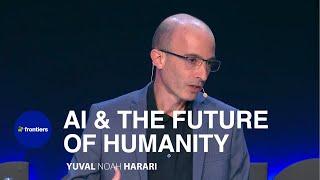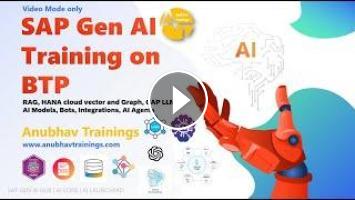SAP Generative AI Training | BTP Generative AI HUB | RAG, Joule Studio, Vector & Graph DB | AI Bots
SAP AI Core is a powerful, scalable runtime environment on SAP Business Technology Platform (BTP) designed to operationalize and manage AI and machine learning models at enterprise scale. It enables data scientists and developers to deploy, monitor, and govern AI workloads using standard open-source tools while integrating seamlessly with SAP and non-SAP systems.
SAP AI Launchpad serves as the unified interface to manage and orchestrate these AI assets, offering visibility into deployed models, inference pipelines, and performance metrics. With a user-friendly UI and role-based access, it facilitates collaboration between IT, business, and data teams.
Together, SAP AI Core and AI Launchpad form the backbone for building intelligent, AI-driven business processes across the SAP ecosystem — from automating document processing and natural language understanding to implementing advanced Retrieval-Augmented Generation (RAG) systems, agentic AI workflows, and knowledge graph-powered applications that transform how enterprises leverage generative AI.
This comprehensive course takes you on a complete journey from Python fundamentals to enterprise-grade generative AI implementation on SAP BTP. You'll start by building a strong foundation in Python programming, advance through machine learning and NLP concepts, then master cutting-edge technologies like Langchain, LangGraph, RAG (Retrieval-Augmented Generation), and agentic AI frameworks.
The course uniquely combines hands-on development with real-world business scenarios — from building intelligent chatbots and AI agents to creating RAG-powered applications with HANA Vector Engine, implementing knowledge graphs, and integrating AI capabilities with SAP S/4HANA systems. You'll work with industry-leading LLMs (GPT, Claude, Llama), implement orchestration services with content filtering and data masking, and deploy production-ready AI solutions to SAP BTP.
By the end of this course, you'll possess the complete skill set to architect, develop, and deploy sophisticated AI solutions that bridge data science innovation with enterprise operations — transforming business processes through intelligent automation and generative AI.
Key areas you’ll focus on include:
1. Python Foundation to Advanced Development: Master Python programming from basics through advanced topics including pandas, database connectivity, UI development with Streamlit, and building reusable modules for enterprise applications.
2. Machine Learning and NLP Implementation: Build classification and regression models, understand neural networks, implement natural language processing with tokenization, embeddings, TF-IDF calculations, and cosine similarity for intelligent text analysis.
3. LangChain, LangGraph, and Agentic AI Architecture: Learn to build sophisticated AI agents using LangChain's framework, implement stateful chatbots with memory, create custom tools, design multi-agent workflows with LangGraph, and understand the difference between GenAI, AI Agents, and Agentic AI systems.
4. RAG (Retrieval-Augmented Generation) with HANA Vector Engine: Implement advanced RAG systems that overcome LLM limitations by combining language models with custom knowledge bases stored in HANA Cloud's vector engine, enabling context-aware responses from proprietary enterprise data.
5. SAP AI Core and AI Launchpad Mastery: Deploy and manage AI models using SAP's Gen AI Hub, create scenarios with foundation models (GPT, Claude), monitor with LangSmith traceability, and build production-grade microservices that integrate with SAP Business Application Studio and SAP Build Apps.
6. Knowledge Graphs and Multi-Modal AI: Work with HANA Cloud Knowledge Graph Engine (KGE), understand RDF triples and SPARQL queries, implement graph-based RAG scenarios, and process image and audio content using open-source models like Llama.
7. Enterprise Integration and Orchestration: Integrate AI capabilities with SAP S/4HANA through OData APIs, implement SAP's orchestration service for content filtering, data masking and grounding, build CAP applications with LLM plugins, and create field agent bots that execute business transactions.
8. End-to-End Deployment and Governance: Package applications using MTA (Multi-Target Applications), deploy to Cloud Foundry on BTP, implement security with app routers and destinations, manage environment variables, and establish governance frameworks for AI operations.
SAP AI Core is a powerful, scalable runtime environment on SAP Business Technology Platform (BTP) designed to operationalize and manage AI and machine learning models at enterprise scale. It enables data scientists and developers to deploy, monitor, and govern AI workloads using standard open-source tools while integrating seamlessly with SAP and non-SAP systems.
SAP AI Launchpad serves as the unified interface to manage and orchestrate these AI assets, offering visibility into deployed models, inference pipelines, and performance metrics. With a user-friendly UI and role-based access, it facilitates collaboration between IT, business, and data teams.
Together, SAP AI Core and AI Launchpad form the backbone for building intelligent, AI-driven business processes across the SAP ecosystem — from automating document processing and natural language understanding to implementing advanced Retrieval-Augmented Generation (RAG) systems, agentic AI workflows, and knowledge graph-powered applications that transform how enterprises leverage generative AI.
This comprehensive course takes you on a complete journey from Python fundamentals to enterprise-grade generative AI implementation on SAP BTP. You'll start by building a strong foundation in Python programming, advance through machine learning and NLP concepts, then master cutting-edge technologies like Langchain, LangGraph, RAG (Retrieval-Augmented Generation), and agentic AI frameworks.
The course uniquely combines hands-on development with real-world business scenarios — from building intelligent chatbots and AI agents to creating RAG-powered applications with HANA Vector Engine, implementing knowledge graphs, and integrating AI capabilities with SAP S/4HANA systems. You'll work with industry-leading LLMs (GPT, Claude, Llama), implement orchestration services with content filtering and data masking, and deploy production-ready AI solutions to SAP BTP.
By the end of this course, you'll possess the complete skill set to architect, develop, and deploy sophisticated AI solutions that bridge data science innovation with enterprise operations — transforming business processes through intelligent automation and generative AI.
Key areas you’ll focus on include:
1. Python Foundation to Advanced Development: Master Python programming from basics through advanced topics including pandas, database connectivity, UI development with Streamlit, and building reusable modules for enterprise applications.
2. Machine Learning and NLP Implementation: Build classification and regression models, understand neural networks, implement natural language processing with tokenization, embeddings, TF-IDF calculations, and cosine similarity for intelligent text analysis.
3. LangChain, LangGraph, and Agentic AI Architecture: Learn to build sophisticated AI agents using LangChain's framework, implement stateful chatbots with memory, create custom tools, design multi-agent workflows with LangGraph, and understand the difference between GenAI, AI Agents, and Agentic AI systems.
4. RAG (Retrieval-Augmented Generation) with HANA Vector Engine: Implement advanced RAG systems that overcome LLM limitations by combining language models with custom knowledge bases stored in HANA Cloud's vector engine, enabling context-aware responses from proprietary enterprise data.
5. SAP AI Core and AI Launchpad Mastery: Deploy and manage AI models using SAP's Gen AI Hub, create scenarios with foundation models (GPT, Claude), monitor with LangSmith traceability, and build production-grade microservices that integrate with SAP Business Application Studio and SAP Build Apps.
6. Knowledge Graphs and Multi-Modal AI: Work with HANA Cloud Knowledge Graph Engine (KGE), understand RDF triples and SPARQL queries, implement graph-based RAG scenarios, and process image and audio content using open-source models like Llama.
7. Enterprise Integration and Orchestration: Integrate AI capabilities with SAP S/4HANA through OData APIs, implement SAP's orchestration service for content filtering, data masking and grounding, build CAP applications with LLM plugins, and create field agent bots that execute business transactions.
8. End-to-End Deployment and Governance: Package applications using MTA (Multi-Target Applications), deploy to Cloud Foundry on BTP, implement security with app routers and destinations, manage environment variables, and establish governance frameworks for AI operations.
- Category
- Artificial Intelligence
- Tags
- sap ai, sap gen ai, generative ai












Comments